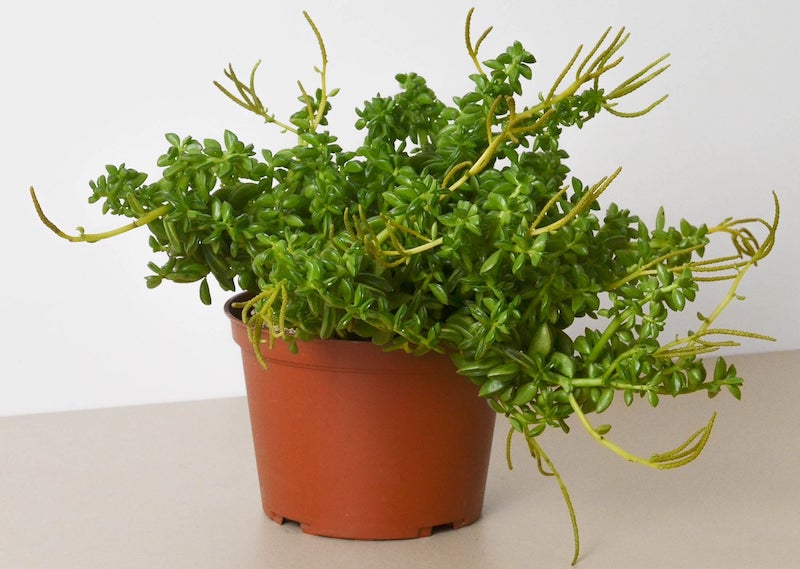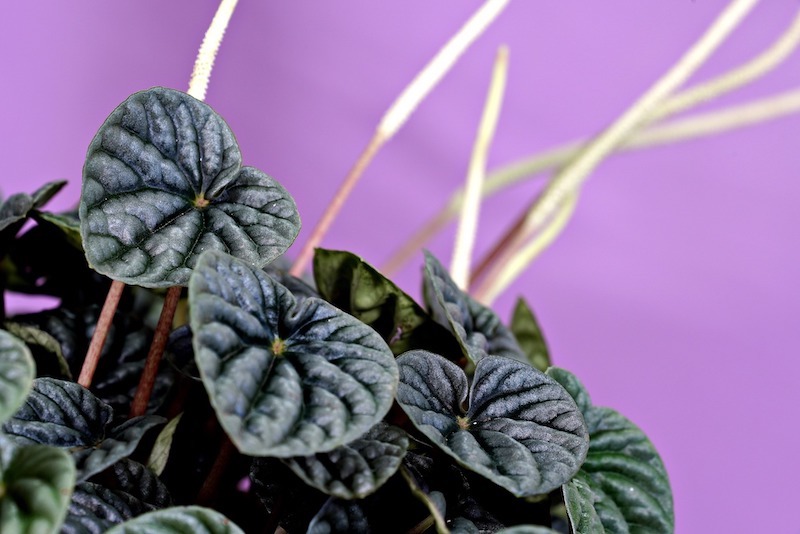Searching for a low-maintenance, easy-to-care-for houseplant that’s also safe for kids and pets? If so, Peperomia is an excellent choice. With only moderate watering and minimal fertilizer needs, this perennial is also non-toxic to humans and pets; you don’t have to worry about racing to the phone at the first sight of a missing leaf. A member of the pepper family, a few species of Peperomia are used as herbs to flavor food and drinks. Cooks in various parts of South America, for instance, use Peperomia pellucida to flavor dishes with its mustard-like taste.

Is Peperomia Poisonous to Children?
Peperomia is nontoxic to kids. However, to preserve its gorgeous foliage, place this houseplant out of the easy reach of little hands and teeth.
Is Peperomia Poisonous to Dogs?
Peperomia should be at the top of any pet-friendly houseplant list, as it is nontoxic. If your dog refuses to leave Peperomia alone, however, you can move this houseplant to a higher location where little paws can’t reach, or spray its leaves with a diluted citrus mixture of lemon and water. Dogs don’t like the taste of citrus.

Is Peperomia Poisonous to Cats?
If you walk through your front door to spot Milo awkwardly grinning while he hurriedly chomps one of Peperomia’s luscious leaves, do not fear. Peperomia is not harmful to cats. However, eating plants is not a normal part of a feline’s diet, so suddenly adding a few greens might upset Milo’s tummy. To limit your cat’s interaction with this plant, place it where curious cat paws and teeth can’t easily reach. If Milo is stubborn and won’t readily agree to your demands, you can mix a bottle of lemon juice and water and spray Peperomia’s leaves. Disliking the citrus flavor, Milo will shake his head in disgust after one lick of Peperomia’s lemony leaves and turn away to explore something else, like that empty cardboard box sitting in the corner of the kitchen.
Is Peperomia Poisonous to Other Animals?
Have no fear, if you notice your bunny, Snuggles, crunching Peperomia’s foliage in your kitchen. Peperomia is non-toxic to humans and animals and can tolerate some nibbling. If house mice are munching Peperomia’s leaves, that’s entirely different. To be closer to their newfound food source, house mice may burrow down into Peperomia’s soil, damaging its roots or introducing harmful bacteria and fungi to the plant via the soil. Either way, the house mice will be fine, but Peperomia may not be. If you suspect house mice, place a few small cotton balls dampened with citronella, peppermint, or cinnamon oil on Peperomia’s soil. These scents traditionally deter mice.
Symptoms Of Peperomia Poisoning
While Peperomia is non-toxic to humans and pets, depending on the species that a human or pet eats, potential side effects, including allergic reactions, diarrhea, and stomach irritation, may be experienced. Always check with your doctor or veterinarian for guidance if you suspect a problem.
Preventing Peperomia Poisoning
While Peperomia is nontoxic to people and pets, most plant owners prefer curious toddlers, dogs, and cats to avoid munching on its beautiful foliage. To protect this evergreen, move it to a higher location, such as atop a plant stand where little hands and paws can’t reach. Alternatively, build a barrier around it, or place cotton balls doused with citrus oil on the surface of the plant’s soil. Dogs and cats do not care for citrus scents.
Pet Poison Helpline
If something were to happen to your furry friend, and you suspect that they are suffering from Peperomia poisoning, there is a poison control hotline to call for 24/7 vet advice. It is called the Pet Poison Hotline, and their phone number is (855) 764-7661.
Sources:
"Peperomia Hederifolia." American Society for the Prevention of Cruelty to Animals. aspca.org
"Toxicity of Common Houseplants." Nebraska Extension in Lancaster County. lancaster.unl.edu
 |
Author Suellen Barnes - Published 3-21-2023 |
